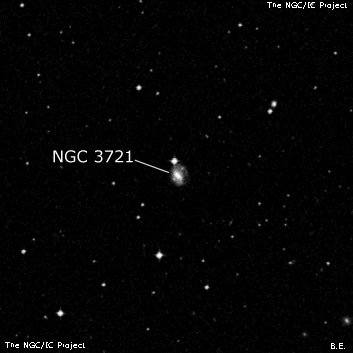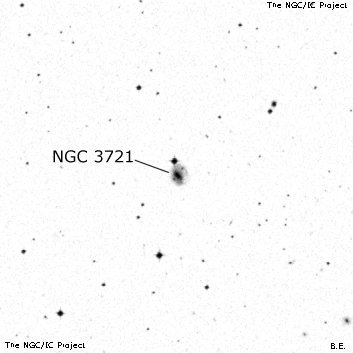NGC/IC Project Restoration Effort
(This is a very very beta version)
NGC3721


Basic Information
Location and Magnitude
Right Ascension: 11:34:7.8
Declination: -9:28:0
Constellation: CRT
Visual Magnitude: 14.5
Historic Information
Discoverer: Leavenworth
Year of discovery: 1886
Discovery aperture: 26.3
Observational
Summary description: eF, eS, R, gbM
Sub-type: S0-a
Corwin's Notes
=====
NGC 3721, 3722, 3724, and 3730. Here is another of the Leander McCormick
fields that is irksome at best, frustrating at worst, and will probably never
be sorted out satisfactorily.
These four numbers are usually applied to various members of a group of
galaxies north of NGC 3732 (found by WH, reobserved by JH, there is no problem
with the identification of this galaxy). There is some justification for
this; the true RAs for the Leander McCormick objects are often east of the
nominal RAs, while the Decs are often (though not always!) fairly accurate.
I've listed these identifications in the big table with two question marks.
In this case, however, there is another group of galaxies to the west of
Leavenworth's nominal positions. The brightest is IC 2910. With two others,
this matches the relative positions, brightnesses, and diameters estimated by
Leavenworth for three (N3721/22/24 of the four objects (though the declination
for the northern-most, N3721, is 4 arcmin off). I've marked these candidate
objects with a single question mark.
This leaves NGC 3730, which Dreyer credits jointly to Leavenworth and A. A.
Common. I'm not convinced that they both saw the same object. If Leavenworth
saw it the same night as the other three, he rezeroed his RA because there is
no galaxy offset from the other three by the amount in his table. This
applies to both groups of galaxies, the one to the east as well as that to the
west.
Here is where we turn to Common's observation. He lists a single nebula at
the position of NGC 3732 calling it "F, R", and adds the note "... a cluster
of 3 similar ones 15' n." Dreyer, noting that Leavenworth's position is about
15 arcmin north of N3732, supposed that one of Common's "cluster" was the
object that Leavenworth saw. However, Dreyer adopted Leavenworth's RA, nearly
a full minute of time preceding N3732. He also has a note in the NGC reading
"Common has '3, F, R, 15[arcmin] n of h913 [N3732].' This is not what Common
actually wrote, of course, though it summarizes the situation pretty well.
But we are still left to wonder which galaxy to take for NGC 3730. Not quite
pulling things out of the hat, I'm going to go with the usual choice for this,
the brightest galaxy in the "cluster" north of NGC 3732. There is a question
mark on it, of course. The fainter spindle just to the south was apparently
not seen by any of the visual observers. Had it been, then the situation with
at least the number 3730 would be a lot clearer.
What about Common's other two galaxies? If the object we take as NGC 3730 is
one of his, then the other two are logically those that are sometimes called
N3722 and N3724 (those with double question marks in the table). It's not
beyond reason, though, to think that he saw those two and the third on to the
east in the line, MCG -01-30-008.
But all this is speculation. We don't have good positions from the original
observers for any of these, so all we can do is -- speculate. Frustrating,
isn't it?
-----
Yann Pothier pointed out in an email from April 2016 that the pair I've called
"NGC 3722?" and "NGC 3724 ?= IC 2910" better match Leavenworth's relative
positions for his pair than any other galaxies in the area. I take this as
another indication that these are reasonable candidates for Leavenworth's
objects.
Steve's Notes
=====
NGC 3721
24" (3/9/13): fairly faint, small, oval 5:3 NW-SE, 24"x15", lens-shaped. Two mag 15/15.5 stars lie 2' SE. The identification of this galaxy with NGC 3721 is uncertain.



